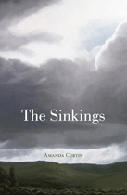 | Amanda Curtin THE SINKINGS University of Western Australia Press, 375 pp. Source: review copy Review by Michael Freedman |
The Sinkings is a novel that pulls the reader in two different directions. Amanda Curtin's debut novel captures the story of Little Jock, a convict shipped from the familiar surroundings of home to a strange land, only to meet a violent end at the hands of a fellow convict in 1882. Little Jock's story is one of confusion, secrecy, betrayal, and violence. His life is never easy, and is characterised by brutality at every turn.
The other protagonist is Willa Sampson, and Willa's story is set in present day Australia. Willa's tale is also a sad one, having tragically lost her daughter Imogen, and been deserted by her husband. Overcome with grief, Willa discovers and gratefully embarks on a new project -- to research and uncover Little Jock's life, and the reasons for his death. This is easier said than done, and the novel moves back and forth through time continually, placing the reader in the shoes of the two main characters. This is done seamlessly, and is never confusing.
Ms Curtin's prose is engaging, and once the reader overcomes the disconcerting feeling of reading a novel that has little dialogue, it is easy to identify and sympathise with the characters and their problems. The Sinkings is, as much as anything else, a story about obsession and Willa's attempts to immerse herself into the life of somebody else, anybody else, to escape the tragic emptiness of her own. Her life and that of Little Jock are entwined in quite a remarkable way -- Willa's daughter and the convict were both born "intersexed", and it is this realisation that gives birth to Willa's overwhelming desire to unravel the complexities of Little Jock's life, and death. Ms Curtin handles the rare condition with sensitivity, even if her characters sometimes don't.
Willa goes to extraordinary lengths (and expense) to uncover Little Jock's secrets, and does so often under the pretence that Little Jock is a family member. There is some irony in this, given her daughter's condition. Secrecy and pretence must play a large, perhaps overwhelming part in the lives of the intersexed, and societal ignorance of the condition is probably not so much different now than it was 125 years ago.
When The Sinkings gets it right, the reader is transported to a time and place where the characters seem real and convincing, facing overwhelming hardships yet always endeavouring with typically human resilience to make it to the other side, painful though the journey might be. The other direction is which the reader may feel themselves being pulled, however, is less positive.
There are times in the novel when it almost feels like piece of non-fiction, and it always treads a very fine line. The Sinkings is quite a long novel, and the impression after having finished reading the story is that it might have benefited from further editing. Research methods employed by Willa, and the drudgery of prison life experienced by Little Jock, are sometimes detailed too extensively, which can detract from the story. In the world of the novel, when there is little doubt where the story is going (and here the murder occurs on the first page), the interest for the reader is all about getting there. Unfortunately, unless the reader has a particular interest in genealogical research or convict life in 19th Century Australia, the lasting impression might be that the author has somewhat belaboured the point. This would be a shame, because behind The Sinkings is fundamentally an interesting story.
